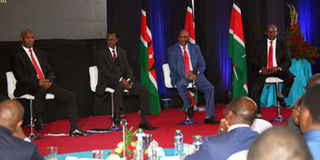We must be willing to go against the grain to allow integrity to advance

From left: Directorate of Criminal Investigations boss Ndegwa Muhoro, Ethics and Anti-Corruption Commission Chief Executive Officer Halakhe Wako, Director of Public Prosecutions Keriako Tobiko and Attorney-General Githu Muigai at the State House Summit on Governance, Anti-Corruption and Accountability at State House in Nairobi on October 18, 2016. PHOTO | EVANS HABIL | NATION MEDIA GROUP
What you need to know:
- How shall integrity overcome oppression?
Millions of diligent Kenyans are oppressed by a system of employment designed to reward the corrupt while denying the conscientious opportunities.
We should not despair in bringing to life chapter six of our Constitution, which deals with leadership and integrity, as it is the only way out of this morass.
This year, 2016, has been one of many political, economic, and social intrigues. Politicians have escalated corruption and impunity, increasingly dwindling the rule of law.
Economically, the weak governance of the banking sector was exposed by the collapse of some banks, as was the complicity of some banks in corruption, namely the National Youth Service scandal.
Socially, religious institutions have ignored integrity. Our mega churches have failed to deliver mega integrity. At the same time, ethnic sentiments still contaminate national unity.
In the Ware Lecture of 2015, American public intellectual Cornel West implored Americans to carry out a critical self-inventory to establish who they have become as a people through exploring how to anchor honesty, decency, and integrity in contemporary America.
As we cross over to another election year, I invite Kenyans to ponder several questions that Dr West attempts to answer in his speech, questions asked by another towering intellectual, W.E.B. Du Bois.
First, how shall integrity overcome oppression? Millions of diligent Kenyans are oppressed by a system of employment designed to reward the corrupt while denying the conscientious opportunities.
We should not despair in bringing to life chapter six of our Constitution, which deals with leadership and integrity, as it is the only way out of this morass.
We must be willing to go against the grain to allow integrity to advance by espousing moral conviction in place of political calculation.
FORGE RELATIONS
Oppression thrives on silence and isolation. We must shout at all forms of oppression and forge relations that transcend tribe, class, and political affiliation.
Second, what does honesty do in the face of deception? Ours has become a country where the accused and guilty have mastered the art of using the courts to thwart justice for their victims. Honesty has been replaced by trickery.
We ought to remind one another that honesty is a torch, not a burden. That it is possible to be successful by being honest in these times of economic, social, and political unsettlement.
Honesty is our most treasured weapon in overcoming deception. We have to show intolerance to morally unsound leaders by voting them out in August 2017.
At the same time, we ought to register our displeasure with the compromised character of the Church as the institution that ought to promote virtue and demand that religious leaders walk the talk of transparency, accountability, and integrity.
Third, what does decency do in the face of insult? In a democratic state, it is decent to exercise instrumental rights such as those of expression, association, and assembly in constitutionally permitted ways. It is how nations are nurtured to greatness.
The ruling political establishment has insulted the civil society as being the “evil society” and normalised a misconstrual of its complicity in regime change. Kenyans ought to challenge the state on such controversial positions by demanding transparency, accountability, and integrity on these claims.
GUARD DECENCY
This is what it takes to guard decency in times when that which is wrong with the political is fast polluting what is decent in the social and economic.
Lastly, how does virtue meet brute force? Our society is plagued by the intransigent forces of inequality, ethnicity, historical injustices, corruption, intolerance to dissent and a condescending insensitivity to the working class.
These forces act against virtues such as solidarity, tolerance, peace, and integrity; ideals that, if embraced, have the potential of healing our nation.
As the carriers of these virtues, we ought to guard and defend our country from further ethical lapse in leadership by adopting an uncompromising attitude against all forms of trickery.
It is important to appreciate that it is in the interests of the political elite that we abort the integrity clarion call and become uncritical of its plunder and impunity.
Leaders who do not have integrity are not trustworthy and consistent with our aspirations for a more unified, all-inclusive, and developed Kenya.
More importantly, they do not have the moral currency and bravery required to deliver our country from the dark place it currently finds itself in as we get into next year’s gruelling electoral contest. The result of achieving the answers to the appeals explored here will be a profound social awareness of our level of integrity.
Churchill Ongere works at Article 19 Eastern Africa.




